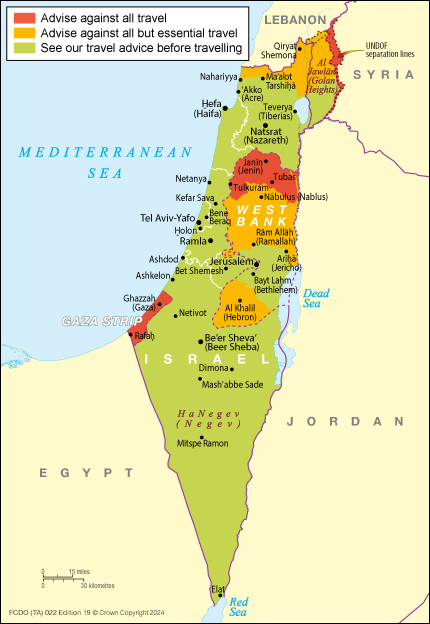Israel
Warnings and insurance

This travel advice covers Israel and the Occupied Palestinian Territories (OPTs).
Your travel insurance could be invalidated if you travel against advice from the Foreign, Commonwealth & Development Office (FCDO).
Areas where FCDO advises against travel
Gaza
FCDO advises against all travel to Gaza.
Areas near Gaza
- FCDO advises against all travel within 500m of the border with Gaza.
The West Bank
- FCDO advises against all travel to Tulkuram Governorate, Jenin Governorate, and Tubas Governorate except Route 90.
- FCDO advises against all but essential travel to the rest of the West Bank, except for, Bethlehem Governorate, Jerusalem Governorate, Ramallah Municipality and, Jericho Municipality (including the areas south and west towards Jerusalem Governate).
Northern Israel
-
FCDO advises against all travel within 500m of the border with Syria (the ‘Alpha Line’).
-
FCDO advises against all but essential travel to the area between the Lebanon border and (but not including) Route 89 excluding Nahriyyah.
Find out more about why FCDO advises against travel.
Conflict with Lebanese Hizballah
Following the conflict between Israel and Lebanese Hizballah (LH), a ceasefire was agreed on 27 November.
There remains a risk that hostilities could reignite, and with little warning. Check Home Front Command for the latest guidance. Restrictions may be put in place at short notice.
Conflict with the Houthis (in Yemen)
Following the conflict between Israel and the Houthis (in Yemen), there continues to be a risk of missile and drone attacks throughout Israel. There is a risk of shrapnel from intercepted missiles falling across Israel and the OPTs and possible disruption at Ben Gurion airport.
Check Home Front Command for the latest guidance. Restrictions may be put in place at short notice.
Conflict in Israel and the OPTs
On 7 October 2023 there was a large-scale terrorist attack by Hamas in southern Israel. The frequency of attacks has significantly decreased but there is still a risk of rocket attacks throughout Israel.
There is an increased risk of political tension which can cause demonstrations and clashes around anniversaries and significant events.
If you are in Israel and the OPTs
If you are in Israel and the OPTs, keep up to date through local media and follow the instructions of Israeli Home Front Command. To find these:
-
visit the Israeli Home Front Command website (available in Israel only)
-
call 104 if you are in Israel
International borders (air and land) in Israel and the OPTs could close at short notice. Check with border officials before you travel for the latest information. Check the travel advice for any neighbouring country that you are planning to travel to or through.
Before travelling within Israel or the OPTs, check the local measures in place, that roads are open and, where appropriate, that scheduled train and bus services are operating.
Monitor this travel advice and other media as the situation is changing fast. Follow and contact FCDO travel on X, Facebook and Instagram. You can also get email notifications when this travel advice is updated.
Read FCDO advice if you’re affected by a crisis abroad.
Travel within or out of Israel or the OPTs is at your own risk. You are encouraged to follow the advice of local authorities, for example on which routes are open or when to take shelter.
Leaving Gaza
Border crossings out of Gaza have been closed to civilians and general traffic since the Israeli military took control of the Rafah crossing on 6 May 2024. Consular support is not available from within Gaza. If you are a British national in Gaza who wants to leave Gaza, you should make contact with us as soon as possible. There are currently no exit routes available for foreign nationals to depart Gaza independently. We are working with the Israeli, Palestinian and other authorities in the region to help British nationals leave via safe routes.
If you are a UK visa holder who meets all of the following criteria, you can contact us to request support to leave Gaza if:
-
you have a spouse/partner or a child aged 17 or under currently living in the UK, and
-
you hold valid permission to enter or remain in the UK for longer than 6 months
Help and support in Israel and the OPTs
Contact your travel provider and insurer
Contact your travel provider and your insurer. They will tell you if they can help and what you need to do.
Help from FCDO in Israel and the OPTs
Consular support is severely limited where FCDO advises against travel.
If you need consular assistance call:
- +44 176 766 7600 (UK number)
- +972 (0)3 725 1222
- +972 (0)2 541 4100
Help from other organisations
Keep up to date with local travel advice through local news outlets and international outlets like the Access Coordination Unit.
Concern for friends and family
If you are in the UK and concerned about a friend or family member who is in Israel or the OPTs call FCDO on 020 7008 5000.
Before you travel
No travel can be guaranteed safe. Read all the advice in this guide and any specific travel advice that applies to you:
- women travellers
- disabled travellers
- LGBT+ travellers
- solo and independent travel
- volunteering and adventure travel
Travel insurance
If you choose to travel, research your destinations and get appropriate travel insurance. Insurance should cover your itinerary, planned activities and expenses in an emergency.
About FCDO travel advice
FCDO provides advice about risks of travel to help British nationals make informed decisions. Find out more about FCDO travel advice.
Get travel advice updates
Sign up to get email notifications when this travel advice is updated.
Follow FCDO: